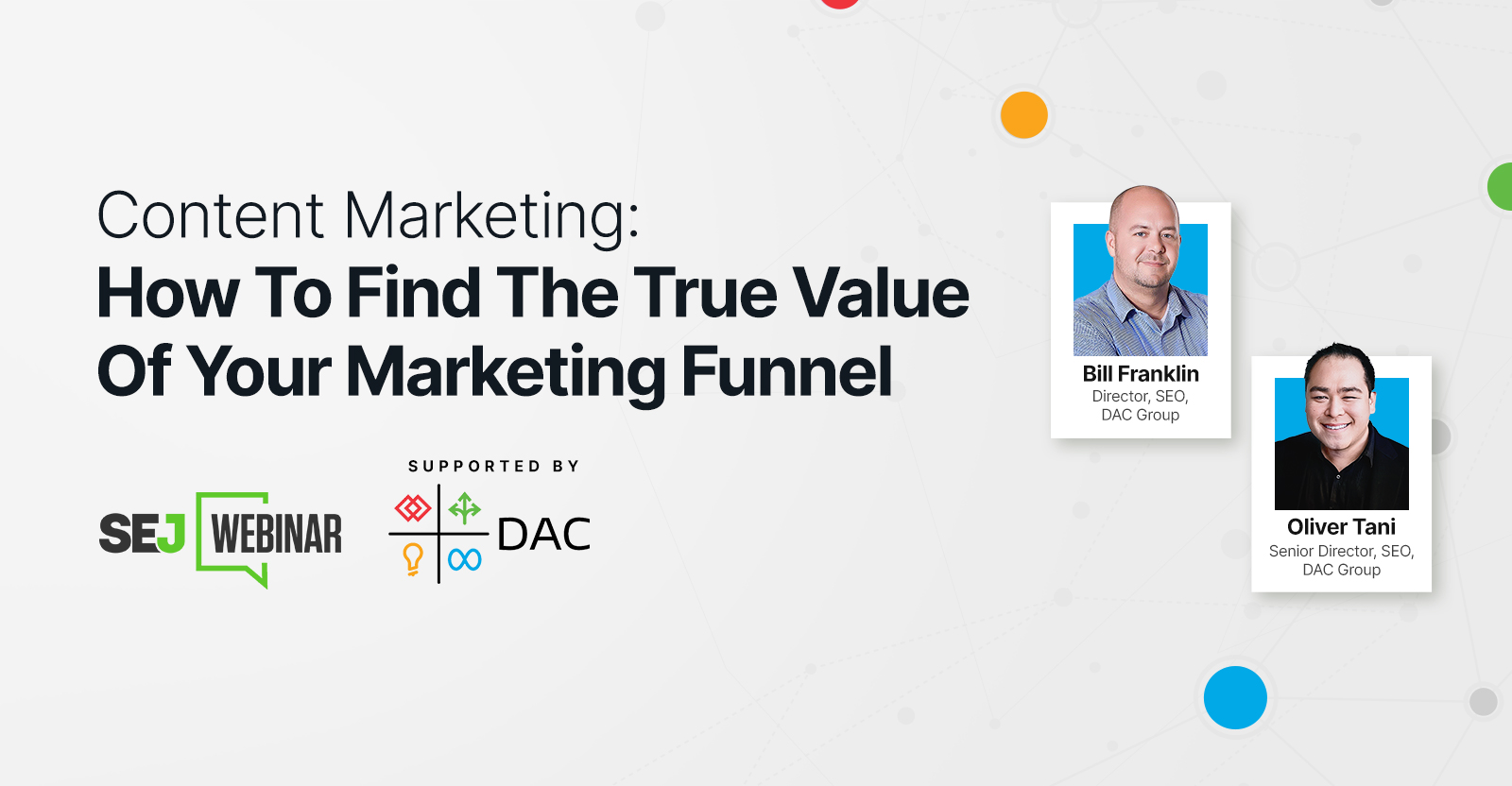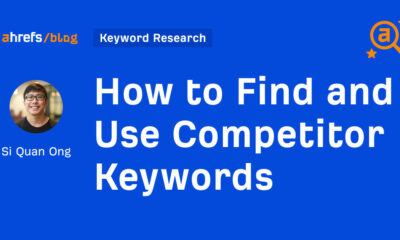SEO
High-Quality Links vs. Low-Quality Links: What’s the Difference?

They are often seen as the most powerful way to rank a site.
But not every link is created equal.
Over time, the search engines have adapted their algorithms to account for links in different ways, narrowing their use for determining the suitability of a webpage as an answer to a search query.
In this post, you will learn what makes a high-quality link, where to find opportunities to build them, and how to evaluate whether a link is worth the budget and effort to get it.
How Do Search Engines Use Links?
Search engines use links pointing to a webpage to both discover its existence and also determine information about it.
Google mentions in its help documentation,
“Google interprets a link from page A to page B as a vote by page A for page B. Votes cast by pages that are themselves “important” weigh more heavily and help to make other pages “important.”
Bing states in its Webmaster Help and How-To guide,
“Bing prefers to see links built organically. This essentially means the links are built by people linking to your content because they find value in your content. This is an important signal to a search engine because it is seen as a vote of confidence in the content.”
What Is Valuable About a Link?
We know that Google uses links like votes.
A link from a well-regarded website will have more clout than a lesser-regarded website.
Authority
This is often discussed as “authority.”
Many SEO tools will try to assign an authority metric to a website or webpage in an attempt to quantify the value of a link from them.
An authoritative webpage linking to your webpage can be a strong signal that it is itself an authoritative source.
In essence, an authoritative website is one that is considered by the search engines to be a reputable source of information about a subject – an authority in it.
Google will, in part, look at that site’s backlinks to determine its expertise and trustworthiness in a subject.
For instance, a website is considered an expert in interior design. It links to a lesser-known website about interior design.
The website by an expert in interior design is confident enough in the content of the lesser-known site that it’s willing to send its visitors there.
That’s a good, impartial way for the search engines to determine the reputation of a site and its authority on a subject.
Relevance
Authority isn’t everything, however.
Think of it like this… you’re going on holiday to a city you’ve never visited.
Who would you rather ask for restaurant recommendations: your friend who lives in the city, or a tour guide for a city 5 hours away from it?
Your friend who lives in the city is likely more of a relevant source of information on the restaurants in the area than the tour guide who doesn’t serve that area.
You might perceive a tour guide to be more knowledgeable about good restaurants, but not if it’s not their area of expertise.
In a similar way, the search engines will understand the value of a website in your industry linking to your webpage.
A website that reviews restaurants will be considered a more relevant source of information about restaurants than a local community group who had an outing to a restaurant.
Both sites may have a page talking about the “best sushi restaurant in New York,” but the restaurant review website will be more relevant in helping the search engines determine what to serve as an answer for “sushi restaurant in New York.”
Authority & Relevance
The best source of a link is a website that is both considered authoritative and relevant to your website.
What Makes a Link Low-Quality?
If we think of a quality link as one that is both relevant and authoritative, then it makes sense that the lowest quality link is one that is both irrelevant and not authoritative.
These sorts of links are usually easy to come by and can be self-created or requested.
For instance, a website that allows anyone to submit a link is unlikely to have highly curated content that would lend it to being authoritative.
The fact that anyone can add a link to the site means it isn’t likely to be particularly relevant to one industry or niche.
Links to your site from a website like this will be low-quality and generally useless.
At best, these links might have a little positive impact on your search rankings but at worst they could be perceived as part of a manipulative linking scheme.
Google has strict guidelines on what is considered a manipulative link.
You might want to familiarize yourself with Bing and Yandex’s definitions, too.
A Word About Paid Links
We all know by now that paying for links to aid rankings is against the guidelines of most big search engines.
In a best-case scenario, the link won’t be identified as having been paid for and you won’t see a penalty from it.
However, if Google detects that you’ve acquired links from websites that sell links, you may find the webpage it links to penalized.
There are legitimate reasons why links might be placed on websites for a fee.
It’s common practice to utilize banner advertising and affiliate marketing on the internet, for example.
In these instances, Google recommends that webmasters declare the links to be sponsored using the rel=”sponsored” attribute.
This indicates to Googlebots that the link is one that has been paid for and is not to be used for calculating PageRank.
These sorts of links have their own value for marketing and should not be discounted simply because they will not necessarily aid in search rankings.
A Word About NoFollow Links
Before Google introduced the use of the rel=”sponsored” attribute, it and other search engines were using the rel=”nofollow” attribute.
Putting a rel=”nofollow” attribute into the HTML for a link shows the search bots that they shouldn’t go to the destination of that link.
This is used by publishers to stop the search engines from visiting the page and ascribing any benefit of the link.
So, if a high-quality page links to your webpage with a link contain a rel=”nofollow” attribute, you won’t see any ranking benefit of that link.
Google announced recently that this attribute is a hint and therefore it might ignore it.
On the whole, this essentially makes a “nofollow” link useless for SEO link-building purposes as link equity will not pass through the link.
However, if people are following the link and discovering your webpage, I would argue it’s not useless at all!
What Do High-Quality Links Looks Like?
Low-quality links are usually those that are either:
- Irrelevant in helping the search engines determine your site’s authority on a subject.
- Or actually harmful.
I’m not addressing link penalties here, or even the sorts of link-building practices that will land you in hot water. For more information on that, see Chuck Price’s article on manual actions.
The low-quality links we’re talking about here are ones that you may well be going after but aren’t benefiting your site.
High-quality links are the Holy Grail of link-building.
They’re the links you show off in your “Team Wins” Slack channel and on Twitter.
They are hard to earn.
I also want to show you some “medium-quality” links.
These are the types of links that are good to get but perhaps won’t move the needle as much as you would like.
They form a part of a healthy backlink profile but aren’t worth your whole content marketing budget to land.
Low Quality: Low Authority/Low Relevance
The sorts of links you are likely to gain that are low-quality and low-relevance are ones that require no real effort to get.
For example, simply sourcing the links and asking for them or, in some cases, adding the link yourself.
Open Directories
These directory sites are very obviously low quality when you visit them. Typically they only offer one service – advertise your website here!
You do not need to pay for a link and everyone and their dog has taken advantage of this.
There will be links from websites in all sorts of industries with very little rhyme or reason as to why this directory exists.
Do note, however, that there are reputable local business directories that can help with verifying your business’s physical address and contact details—Yelp, for instance.
These listings are useful for local citations but are unlikely to really aid in boosting your site’s rankings.
The difference between reputable local directories and generic open directories is quite obvious when you visit them.
Comment Links
Forums ad blogs can be very relevant to a particular industry.
However, due to the ease with which anyone can add content to a forum page or blog comments, any links in that user-generated content are usually discounted by the search engines.
In recent SEO history, blog and forum comments were easy targets for squeezing in a link to a site.
The search engines became wise to this and started devaluing those links.
Alongside the rel=”sponsored” attribute, Google released rel=”ugc”.
This is a way for webmasters to indicate that the links within their forums are user-generated.
Low Quality: Low Effort & No Follow
Social Media Posts
Most large social media sites will use “no follow” tags on them.
However, Google did recently say that “nofollow” tags would be taken as hints rather than concretely respected.
Despite this, social media sites are not the place to go looking for backlinks to help your rankings.
Although social media sites themselves are often authoritative, they are full of uncurated content.
Businesses can set up their own social media pages with links back to their websites. They can talk about their sites in their posts.
These links are not unbiased. Due to this, they are largely ignored by search engines.
Medium Quality: Low Authority but High Relevancy
Small Industry Blogs
Most industries have a proliferation of blogs. Sites run by companies or individuals who want to share their knowledge and build their profile.
There are some highly relevant, niche blogs that might not be well-known enough to be getting their own authority-metric boosting backlinks.
They are, however, full of decent content and very relevant to the website you are trying to grow.
Small industry blog writers are often less over-run with requests to share content and add links than the well-known ones.
They are, however, keen to write and build community.
A smaller blog featuring your site is still a good reinforcement of your relevance to your industry.
This can help enormously with showing your relevance to search topics associated with that industry.
Small Industry Brands
There will be some staple brands in your industry that aren’t necessarily competitors but are tangentially related.
Think of paper manufacturers to your office supply store, for example.
A link from the paper manufacturer showing your store as their distributor can help show your authority in the industry.
Medium Quality: Medium Authority & Medium Low Relevancy
Local News Sites
Your local news site may report on anything to do with your community, or they might be more discerning.
Regardless, doing something considered locally newsworthy can get you featured a lot easier than in a national news website.
These are especially good links to get if you are trying to boost your local SEO efforts.
A link from a website known as a source of reliable local information could help the search engines to see your relevance to that physical area.
High Quality: High Authority but Medium/Low Relevancy
Some sites are extremely authoritative and hard to get a link from. These tend to be beneficial to your SEO efforts.
These sorts of links might not be highly relevant, however.
Although you will see a benefit to your search visibility, it may not help solidify your relevance for particular topics.
National News Sites
There are some national and international newspapers with extremely high authority websites. A link from these sites is worth the effort.
However, journalists are inundated with hundreds of press releases and article ideas every day.
It can be incredibly difficult to get featured, especially with a link.
The best way to get coverage in a national newspaper is to do something newsworthy.
Bringing it to the attention of the site’s journalists might help you get it covered, hopefully with a link back to your site.
High Quality: Medium Authority but High Relevancy
Big Industry Blogs
That website that everyone in the industry goes to for their news; your friends and family may not have heard of it, but your colleagues definitely have.
It’s likely to be a medium authority site according to authority metrics but it’s a leader in your industry.
It’s also very relevant to the website you’re promoting.
A link from a site like this will go a long way in showing your site’s expertise.
High Quality: High Authority & High Relevancy
Big Industry Brands
These are household names; the companies everyone in your industry (and possibly their families) know of.
These links are likely to be medium to high authority according to the tools but definitely leaders in your industry.
If you are linked to as a supplier or distributor, or even just mentioned in a favorable review, you are likely to see the ranking benefit.
Conclusion
A wide and varied link profile is good for SEO.
If you are actively looking to increase links to your site in an organic manner, it’s imperative you know how to generate high-quality links.
Don’t waste your time going for easy links on unrelated and low-quality sites.
Instead, focus your energy and budget on creating truly newsworthy content and bringing it to the attention of authoritative and relevant publishers.
More Resources:
SEO
Measuring Content Impact Across The Customer Journey

Understanding the impact of your content at every touchpoint of the customer journey is essential – but that’s easier said than done. From attracting potential leads to nurturing them into loyal customers, there are many touchpoints to look into.
So how do you identify and take advantage of these opportunities for growth?
Watch this on-demand webinar and learn a comprehensive approach for measuring the value of your content initiatives, so you can optimize resource allocation for maximum impact.
You’ll learn:
- Fresh methods for measuring your content’s impact.
- Fascinating insights using first-touch attribution, and how it differs from the usual last-touch perspective.
- Ways to persuade decision-makers to invest in more content by showcasing its value convincingly.
With Bill Franklin and Oliver Tani of DAC Group, we unravel the nuances of attribution modeling, emphasizing the significance of layering first-touch and last-touch attribution within your measurement strategy.
Check out these insights to help you craft compelling content tailored to each stage, using an approach rooted in first-hand experience to ensure your content resonates.
Whether you’re a seasoned marketer or new to content measurement, this webinar promises valuable insights and actionable tactics to elevate your SEO game and optimize your content initiatives for success.
View the slides below or check out the full webinar for all the details.
SEO
How to Find and Use Competitor Keywords

Competitor keywords are the keywords your rivals rank for in Google’s search results. They may rank organically or pay for Google Ads to rank in the paid results.
Knowing your competitors’ keywords is the easiest form of keyword research. If your competitors rank for or target particular keywords, it might be worth it for you to target them, too.
There is no way to see your competitors’ keywords without a tool like Ahrefs, which has a database of keywords and the sites that rank for them. As far as we know, Ahrefs has the biggest database of these keywords.
How to find all the keywords your competitor ranks for
- Go to Ahrefs’ Site Explorer
- Enter your competitor’s domain
- Go to the Organic keywords report
The report is sorted by traffic to show you the keywords sending your competitor the most visits. For example, Mailchimp gets most of its organic traffic from the keyword “mailchimp.”


Since you’re unlikely to rank for your competitor’s brand, you might want to exclude branded keywords from the report. You can do this by adding a Keyword > Doesn’t contain filter. In this example, we’ll filter out keywords containing “mailchimp” or any potential misspellings:


If you’re a new brand competing with one that’s established, you might also want to look for popular low-difficulty keywords. You can do this by setting the Volume filter to a minimum of 500 and the KD filter to a maximum of 10.


How to find keywords your competitor ranks for, but you don’t
- Go to Competitive Analysis
- Enter your domain in the This target doesn’t rank for section
- Enter your competitor’s domain in the But these competitors do section


Hit “Show keyword opportunities,” and you’ll see all the keywords your competitor ranks for, but you don’t.


You can also add a Volume and KD filter to find popular, low-difficulty keywords in this report.


How to find keywords multiple competitors rank for, but you don’t
- Go to Competitive Analysis
- Enter your domain in the This target doesn’t rank for section
- Enter the domains of multiple competitors in the But these competitors do section


You’ll see all the keywords that at least one of these competitors ranks for, but you don’t.


You can also narrow the list down to keywords that all competitors rank for. Click on the Competitors’ positions filter and choose All 3 competitors:


- Go to Ahrefs’ Site Explorer
- Enter your competitor’s domain
- Go to the Paid keywords report


This report shows you the keywords your competitors are targeting via Google Ads.
Since your competitor is paying for traffic from these keywords, it may indicate that they’re profitable for them—and could be for you, too.
You know what keywords your competitors are ranking for or bidding on. But what do you do with them? There are basically three options.
1. Create pages to target these keywords
You can only rank for keywords if you have content about them. So, the most straightforward thing you can do for competitors’ keywords you want to rank for is to create pages to target them.
However, before you do this, it’s worth clustering your competitor’s keywords by Parent Topic. This will group keywords that mean the same or similar things so you can target them all with one page.
Here’s how to do that:
- Export your competitor’s keywords, either from the Organic Keywords or Content Gap report
- Paste them into Keywords Explorer
- Click the “Clusters by Parent Topic” tab


For example, MailChimp ranks for keywords like “what is digital marketing” and “digital marketing definition.” These and many others get clustered under the Parent Topic of “digital marketing” because people searching for them are all looking for the same thing: a definition of digital marketing. You only need to create one page to potentially rank for all these keywords.


2. Optimize existing content by filling subtopics
You don’t always need to create new content to rank for competitors’ keywords. Sometimes, you can optimize the content you already have to rank for them.
How do you know which keywords you can do this for? Try this:
- Export your competitor’s keywords
- Paste them into Keywords Explorer
- Click the “Clusters by Parent Topic” tab
- Look for Parent Topics you already have content about
For example, if we analyze our competitor, we can see that seven keywords they rank for fall under the Parent Topic of “press release template.”


If we search our site, we see that we already have a page about this topic.


If we click the caret and check the keywords in the cluster, we see keywords like “press release example” and “press release format.”


To rank for the keywords in the cluster, we can probably optimize the page we already have by adding sections about the subtopics of “press release examples” and “press release format.”
3. Target these keywords with Google Ads
Paid keywords are the simplest—look through the report and see if there are any relevant keywords you might want to target, too.
For example, Mailchimp is bidding for the keyword “how to create a newsletter.”


If you’re ConvertKit, you may also want to target this keyword since it’s relevant.
If you decide to target the same keyword via Google Ads, you can hover over the magnifying glass to see the ads your competitor is using.


You can also see the landing page your competitor directs ad traffic to under the URL column.


Learn more
Check out more tutorials on how to do competitor keyword analysis:
SEO
Google Confirms Links Are Not That Important

Google’s Gary Illyes confirmed at a recent search marketing conference that Google needs very few links, adding to the growing body of evidence that publishers need to focus on other factors. Gary tweeted confirmation that he indeed say those words.
Background Of Links For Ranking
Links were discovered in the late 1990’s to be a good signal for search engines to use for validating how authoritative a website is and then Google discovered soon after that anchor text could be used to provide semantic signals about what a webpage was about.
One of the most important research papers was Authoritative Sources in a Hyperlinked Environment by Jon M. Kleinberg, published around 1998 (link to research paper at the end of the article). The main discovery of this research paper is that there is too many web pages and there was no objective way to filter search results for quality in order to rank web pages for a subjective idea of relevance.
The author of the research paper discovered that links could be used as an objective filter for authoritativeness.
Kleinberg wrote:
“To provide effective search methods under these conditions, one needs a way to filter, from among a huge collection of relevant pages, a small set of the most “authoritative” or ‘definitive’ ones.”
This is the most influential research paper on links because it kick-started more research on ways to use links beyond as an authority metric but as a subjective metric for relevance.
Objective is something factual. Subjective is something that’s closer to an opinion. The founders of Google discovered how to use the subjective opinions of the Internet as a relevance metric for what to rank in the search results.
What Larry Page and Sergey Brin discovered and shared in their research paper (The Anatomy of a Large-Scale Hypertextual Web Search Engine – link at end of this article) was that it was possible to harness the power of anchor text to determine the subjective opinion of relevance from actual humans. It was essentially crowdsourcing the opinions of millions of website expressed through the link structure between each webpage.
What Did Gary Illyes Say About Links In 2024?
At a recent search conference in Bulgaria, Google’s Gary Illyes made a comment about how Google doesn’t really need that many links and how Google has made links less important.
Patrick Stox tweeted about what he heard at the search conference:
” ‘We need very few links to rank pages… Over the years we’ve made links less important.’ @methode #serpconf2024″
Google’s Gary Illyes tweeted a confirmation of that statement:
“I shouldn’t have said that… I definitely shouldn’t have said that”
Why Links Matter Less
The initial state of anchor text when Google first used links for ranking purposes was absolutely non-spammy, which is why it was so useful. Hyperlinks were primarily used as a way to send traffic from one website to another website.
But by 2004 or 2005 Google was using statistical analysis to detect manipulated links, then around 2004 “powered-by” links in website footers stopped passing anchor text value, and by 2006 links close to the words “advertising” stopped passing link value, links from directories stopped passing ranking value and by 2012 Google deployed a massive link algorithm called Penguin that destroyed the rankings of likely millions of websites, many of which were using guest posting.
The link signal eventually became so bad that Google decided in 2019 to selectively use nofollow links for ranking purposes. Google’s Gary Illyes confirmed that the change to nofollow was made because of the link signal.
Google Explicitly Confirms That Links Matter Less
In 2023 Google’s Gary Illyes shared at a PubCon Austin that links were not even in the top 3 of ranking factors. Then in March 2024, coinciding with the March 2024 Core Algorithm Update, Google updated their spam policies documentation to downplay the importance of links for ranking purposes.
The documentation previously said:
“Google uses links as an important factor in determining the relevancy of web pages.”
The update to the documentation that mentioned links was updated to remove the word important.
Links are not just listed as just another factor:
“Google uses links as a factor in determining the relevancy of web pages.”
At the beginning of April Google’s John Mueller advised that there are more useful SEO activities to engage on than links.
Mueller explained:
“There are more important things for websites nowadays, and over-focusing on links will often result in you wasting your time doing things that don’t make your website better overall”
Finally, Gary Illyes explicitly said that Google needs very few links to rank webpages and confirmed it.
I shouldn’t have said that… I definitely shouldn’t have said that
— Gary 鯨理/경리 Illyes (so official, trust me) (@methode) April 19, 2024
Why Google Doesn’t Need Links
The reason why Google doesn’t need many links is likely because of the extent of AI and natural language undertanding that Google uses in their algorithms. Google must be highly confident in its algorithm to be able to explicitly say that they don’t need it.
Way back when Google implemented the nofollow into the algorithm there were many link builders who sold comment spam links who continued to lie that comment spam still worked. As someone who started link building at the very beginning of modern SEO (I was the moderator of the link building forum at the #1 SEO forum of that time), I can say with confidence that links have stopped playing much of a role in rankings beginning several years ago, which is why I stopped about five or six years ago.
Read the research papers
Authoritative Sources in a Hyperlinked Environment – Jon M. Kleinberg (PDF)
The Anatomy of a Large-Scale Hypertextual Web Search Engine
Featured Image by Shutterstock/RYO Alexandre
-

 PPC5 days ago
PPC5 days ago19 Best SEO Tools in 2024 (For Every Use Case)
-

 MARKETING6 days ago
MARKETING6 days agoStreamlining Processes for Increased Efficiency and Results
-
SEARCHENGINES6 days ago
Daily Search Forum Recap: April 17, 2024
-

 SEO6 days ago
SEO6 days agoAn In-Depth Guide And Best Practices For Mobile SEO
-

 PPC6 days ago
PPC6 days ago97 Marvelous May Content Ideas for Blog Posts, Videos, & More
-
SEARCHENGINES5 days ago
Daily Search Forum Recap: April 18, 2024
-

 MARKETING6 days ago
MARKETING6 days agoEcommerce evolution: Blurring the lines between B2B and B2C
-
SEARCHENGINES4 days ago
Daily Search Forum Recap: April 19, 2024















